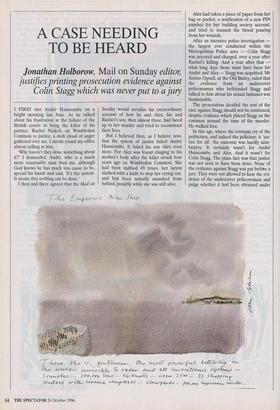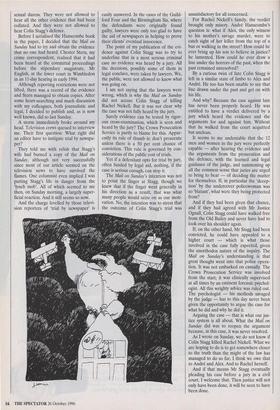A CASE NEEDING TO BE HEARD
Jonathan Holborow, Mail on Sunday editor,
justifies printing prosecution evidence against Colin Stagg which was never put to a jury
I FIRST met Andre Hanscombe on a bright morning last June. As he talked about his frustration at the failure of the British courts to bring the killer of his partner, Rachel Nickell, on Wimbledon Common to justice, a dark cloud of anger gathered over me. I strode round my office almost yelling at him.
`Why haven't they done something about it?' I demanded. Andre, who is a much more reasonable man than me, although God knows he has much less cause to be, spread his hands and said, 'It's the system. It seems that nothing can be done.'
I then and there agreed that the Mail on Sunday would serialise his extraordinary account of how he and Alex, his and Rachel's son, then almost three, had faced up to her murder and tried to reconstruct their lives.
But I believed then, as I believe now, that the system of justice failed Andre Hanscombe. It failed his son Alex even more. For Alex was found clinging to his mother's body after the killer struck four years ago on Wimbledon Common. She had been stabbed 49 times, her larynx slashed with a knife to stop her crying out, and had been sexually assaulted from behind, possibly while she was still alive. Alex had taken a piece of paper from her bag or pocket, a notification of a new PIN number for her building society account, and tried to staunch the blood pouring from her wounds.
After an intensive police investigation — the largest ever conducted within the Metropolitan Police area — Colin Stagg was arrested and charged, over a year after Rachel's killing. And a year after that what long days those must have been for Andre and Alex — Stagg was acquitted. Mr Justice Ognall, at the Old Bailey, ruled that the evidence from an undercover policewoman who befriended Stagg and talked to him about his sexual fantasies was inadmissible.
The prosecution decided the rest of the case against Stagg should not be continued, despite evidence which placed Stagg on the common around the time of the murder. He walked free.
In this age, where the constant cry of the politicians, and indeed the judiciary, is 'jus- tice for all', the outcome was hardly satis- factory. It certainly wasn't for Andre Hanscombe and Alex. And it wasn't for Colin Stagg. The plain fact was that justice was not seen to have been done. None of the evidence against Stagg was put befcfre a jury. They were not allowed to hear the evi- dence of the undercover policewoman and judge whether it had been obtained under sexual duress. They were not allowed to hear all the other evidence that had been collated. And they were not allowed to hear Cohn Stagg's defence.
Before I serialised the Hanscombe book in the paper, I decided that the Mail on Sunday had to try and obtain the evidence that no one had heard. Chester Stern, my crime correspondent, realised that it had been heard at the committal proceedings before the stipendary magistrate, Mr English, at the lower court in Wimbledon in an 11-day hearing in early 1994.
Although reporting restrictions were not lifted, there was a record of the evidence and Stern managed to obtain copies. After some heart-searching and much discussion with my colleagues, both journalistic and legal, I decided to publish and, as is now well known, did so last Sunday.
A storm immediately broke around my head. Television crews queued to interview me. Their first question: What right did an editor have to instigate trial by newspa- per?
They told me with relish that Stagg's wife had burned a copy of the Mail on Sunday, although not very successfully since most of our article seemed on the television news to have survived the flames. One columnist even implied I was putting Stagg's life in danger from the `lynch mob'. All of which seemed to me then, on Sunday morning, a largely super- ficial reaction. And it still seems so now.
And the charge levelled by those televi- sion reporters of 'trial by newspaper' is easily answered. In the cases of the Guild- ford Four and the Birmingham Six, where the defendants were originally found guilty, lawyers were only too glad to have the aid of newspapers in helping to prove their clients' eventual innocence.
The point of my publication of the evi- dence against Colin Stagg was to try to underline that in a most serious criminal case no evidence was heard by a jury. All the decisions, possibly some of them in legal conclave, were taken by lawyers. We, the public, were not allowed to know what was going on.
I am not saying that the lawyers were wrong, which is why the Mail on Sunday did not accuse Colin Stagg of killing Rachel Nickell. But it was not clear why the case was not fully heard by the jury.
Surely evidence can be tested by rigor- ous cross-examination, which is seen and heard by the jury? The Crown Prosecution Service is partly to blame for this. Appar- ently its rule of thumb is: don't prosecute unless there is a 50 per cent chance of conviction. This rule is governed by con- siderations of the public cost of trials.
Yet if a defendant opts for trial by jury, often funded by legal aid, nothing, if the case is serious enough, can stop it.
The Mail on Sunday's intention was not to point the finger at Stagg, though we knew that if the finger went generally in his direction as a result, that was what many people would seize on as our moti- vation. No, the intention was to stress that the outcome of Colin Stagg's trial was unsatisfactory for all concerned.
For Rachel Nickell's family, the verdict brought only misery. Andre Hanscombe's question is: what if Alex, the only witness to his mother's savage murder, were to catch sight of her killer from the top of a bus or walking in the street? How could he ever bring up his son to believe in justice? he lamented. How could he ever draw a line under the horrors of the past, when the past remained unresolved?
By a curious twist of fate Cohn Stagg is left in a similar state of limbo to Alex and Andre. He too has been unable to see that line drawn under the past and get on with his life.
And why? Because the case against him has never been properly heard. He was entitled to have a verdict delivered by a jury which heard the evidence and the arguments for and against him. Without that he walked from the court acquitted but unclean.
It seems to me undeniable that the 12 men and women in the jury were perfectly capable — after hearing the evidence and the arguments from the prosecution and the defence, with the learned and legal guidance of the judge, and summoning up all the common sense that juries are urged to bring to bear — of deciding the matter for themselves. If, in particular the 'decep- tion' by the undercover policewoman was so 'blatant', what were they being protected from?
And if they had been given that chance, and if they had agreed with Mr Justice Ognall, Cohn Stagg could have walked free from the Old Bailey and never have had to look over his shoulder again.
If, on the other hand, Mr Stagg had been convicted, he could have appealed to a higher court — which is what those involved in the case fully expected, given the unorthodox nature of the inquiry. The Mail on Sunday's understanding is that great thought went into that police opera- tion. It was not embarked on casually. The Crown Prosecution Service was involved from the start; it was clinically supervised at all times by an eminent forensic psychol- ogist. All this weighty advice was ruled out. The psychologist — his methods savaged by the judge — has to this day never been given the opportunity to argue the case for what he did and why he did it.
Arguing the case — that is what our jus- tice system is all about. What the Mail on Sunday did was to reopen the argument because, in this case, it was never resolved.
As I wrote on Sunday, we do not know if Cohn Stagg killed Rachel Nickell. What we are hoping to do is to get somewhere closer to the truth than the might of the law has managed to do so far. I think we owe that to Andre and Alex. And to Rachel herself.
And if that means Mr Stagg eventually pleading his case before a jury in a civil court, I welcome that. Then justice will not only have been done, it will be seen to have been done.



















































































 Previous page
Previous page